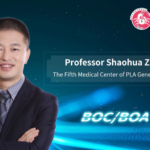
Editor's Note: At the 32nd International Society on Thrombosis and Haemostasis (ISTH 2024) conference, the research team led by Professor Xiaoyu Zhu and Dr. Aijie Huang from The First Affiliated Hospital of the University of Science and Technology of China (Anhui Provincial Hospital) garnered significant attention. Their study on the efficacy and safety of avatrombopag for treating thrombocytopenia following cord blood transplantation (UCBT) was selected for oral presentation (OC33.3), with Dr. Huang delivering the report. This study not only showcases the exceptional capabilities of Chinese research teams in hematology but also contributes valuable insights to the global hematology community. "Oncology Frontier - Hematology Frontier" had an exclusive interview with Dr. Aijie Huang to delve deeper into the research and discuss future plans in the field of UCBT.Oncology Frontier – Hematology Frontier: Given the positive effects of avatrombopag on platelet engraftment, could you share any safety concerns observed during the study? What potential side effects should clinicians be aware of in clinical practice?
Dr. Aijie Huang: Avatrombopag is a drug without hepatic viral groups or metal chelating groups and is approved in China mainly for treating thrombocytopenia related to chronic liver disease undergoing diagnostic procedures or surgery. It has low requirements for liver and kidney function, and we have not observed any adverse reactions related to this drug so far.
However, in clinical practice, we noticed that some patients experienced rapid increases in platelet counts after using avatrombopag, which could reach high levels and potentially lead to complications such as venous thrombosis. Therefore, when encountering a rapid rise in platelet count, we recommend promptly discontinuing the drug and closely monitoring platelet counts during treatment.
Regarding concerns about using TPO receptor agonists (including avatrombopag), such as bone marrow fibrosis and malignant clonal proliferative diseases, large randomized controlled phase 3 clinical trials have reported that avatrombopag does not exhibit more severe adverse reactions than placebos. The most common adverse reaction is headache. There are no reports of bone marrow fibrosis or malignant clonal proliferative diseases to date.
According to the Chinese expert consensus, TPO receptor agonists, including avatrombopag, are not recommended for patients with intermediate-2 or high-risk myelodysplastic syndrome (MDS) or acute myeloid leukemia (AML). For other types of patients, regular monitoring of bone marrow fibrosis grading, collagen fiber proliferation, and changes in blood counts and cell morphology is advised during treatment.
Oncology Frontier – Hematology Frontier: Professor Xiaoyu Zhu’s team has provided valuable insights into the clinical application of unrelated cord blood transplantation (UCBT). What future directions will your team explore in UCBT research?
Dr. Aijie Huang: Our team, led by Professor Xiaoyu Zhu, specializes in cord blood transplantation. To date, we have successfully performed over 2,000 cord blood transplants. Last year alone, we completed nearly 200 procedures. Despite the unique advantages of cord blood transplantation, patients still face several key challenges post-transplant, including cytopenias and the inability to provide donor lymphocyte infusions (DLI).
Firstly, post-transplant relapse is a significant challenge due to the lack of donor-derived cell infusions for relapse prevention or treatment. Secondly, the limited number of hematopoietic stem cells in cord blood often leads to delayed platelet reconstitution post-transplant. Additionally, acute graft-versus-host disease (GVHD) is a major cause of non-relapse mortality, with a relatively high incidence rate.
To address these issues, our team will continue to explore three key areas: First, to tackle delayed platelet reconstitution post-transplant, we have conducted a series of studies, including retrospective and prospective clinical trials on avatrombopag and a multicenter, single-arm clinical study on hetrombopag, to explore the efficacy of TPO receptor agonists, improve platelet engraftment times, and enhance patient survival. Second, we are utilizing multi-omics technologies to investigate the mechanisms behind persistent thrombocytopenia post-cord blood transplantation, aiming to identify therapeutic targets to further improve patient survival. Third, to address relapse and acute GVHD, we are conducting several clinical studies, including the application of double-negative T (DNT) cells or γδT cells for relapse prevention and treatment, and exploring circadian rhythm regulation and cellular immunotherapy for acute GVHD prevention and treatment.
Our team strives to make significant contributions to the field of cord blood transplantation through clinical and mechanistic research efforts.
Dr. Xiaoyu Zhu
Chief Physician, MD, PhD supervisor, and postdoctoral mentor, Director of the Department of Hematology, First Affiliated Hospital of the University of Science and Technology of China (Anhui Provincial Hospital), Deputy Director of the Institute of Hematology and Cell Therapy, University of Science and Technology of China, and Deputy Director of the Anhui Provincial Key Laboratory of Blood Cell Research and Application. He is a candidate for Anhui Province Academic and Technical Leaders, a leading health innovation talent in the ninth batch of Anhui Province’s “Special Support Plan,” a distinguished health talent of the first Anhui Province, recipient of the Anhui Provincial Outstanding Youth Fund, and leader of the excellent scientific research and innovation team for “Cord Blood Transplantation in Malignant Hematologic Diseases” in Anhui Province. He has studied at the University of Maryland in the United States and the University of Toronto in Canada.
Academic Appointments: Vice Chairman of the Aplastic Anemia Working Group of the Chinese Hematology Association; Member of the Hematopoietic Stem Cell Application Group of the 11th Committee of the Hematology Branch of the Chinese Medical Association; Member of the Hematology Physician Branch of the Chinese Medical Doctor Association; Member of the Hematology Oncology Professional Committee of the Chinese Anti-Cancer Association; Member of the Youth Committee of the 9th and 10th Hematology Branch of the Chinese Medical Association; Vice Chairman of the 8th Committee of the Hematology Branch of the Anhui Medical Association; Chairman of the Hematology Quality Control Center of Anhui Province. Dr. Zhu has long been engaged in the diagnosis and treatment of malignant hematological diseases and hematopoietic stem cell transplantation, particularly in the field of cord blood transplantation. He is dedicated to researching the biological characteristics and clinical application of double-negative T (DNT) cells, hematopoietic stem cell in vitro expansion, and megakaryocyte differentiation. He has led four National Natural Science Foundation of China projects and four provincial and ministerial-level projects. In recent years, he has published over 20 SCI papers as a corresponding author (including co-corresponding) in journals such as Blood, Blood Advances, Bioactive Materials, and American Journal of Hematology.
Dr. Aijie Huang
PhD in Clinical Medicine (Hematology) from the First Affiliated Hospital of the University of Science and Technology of China (Anhui Provincial Hospital). Dr. Huang is engaged in both basic and clinical research on allogeneic hematopoietic stem cell transplantation and is a member of the excellent scientific research and innovation team for “Cord Blood Transplantation in Malignant Hematologic Diseases” in Anhui Province. Over the past three years, Dr. Huang has published four SCI papers as the first or co-first author.


